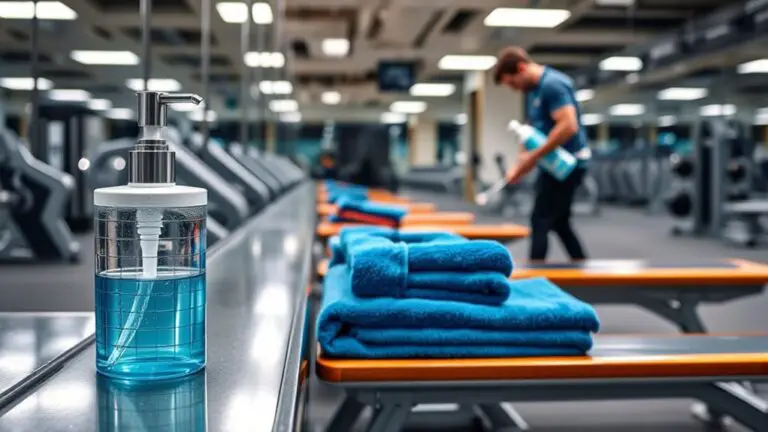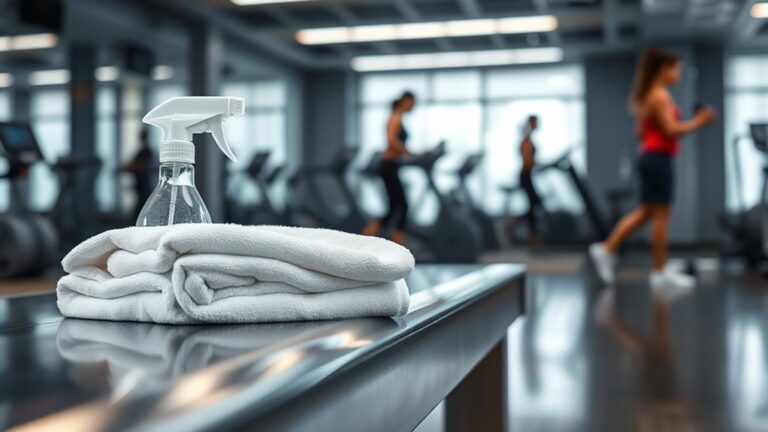Why You Should Never Share Gym Towels
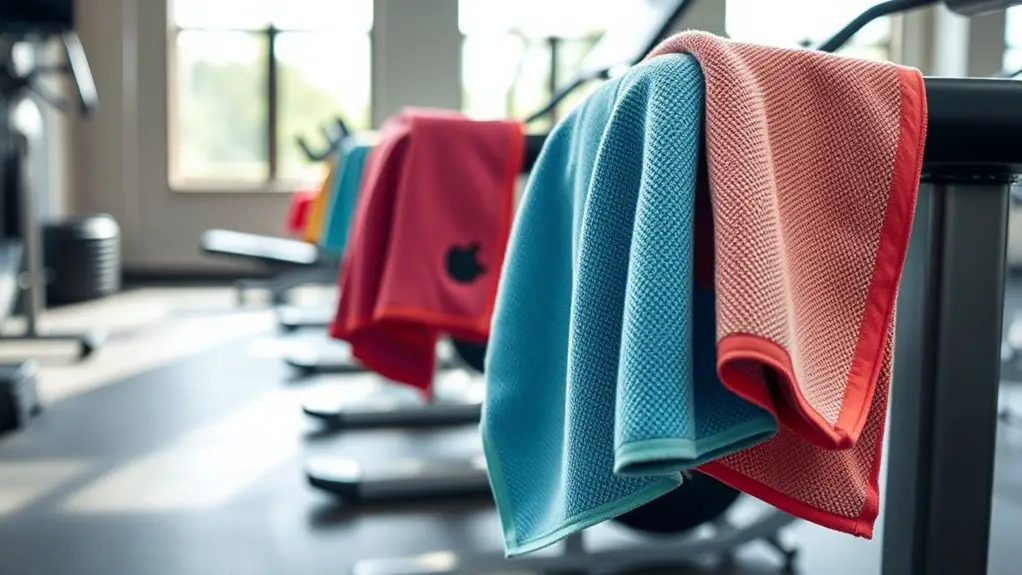
Sharing gym towels can expose you to harmful bacteria and fungi, increasing your risk of skin infections and irritations. Towels trap moisture, making them breeding grounds for pathogens like *Staphylococcus aureus* and fungi that cause issues like athlete’s foot. Using personal towels not only protects your skin but also enhances overall hygiene in shared spaces. Plus, there are better alternatives that can keep you clean without the risks. Discover more about towel hygiene and its importance for your health.
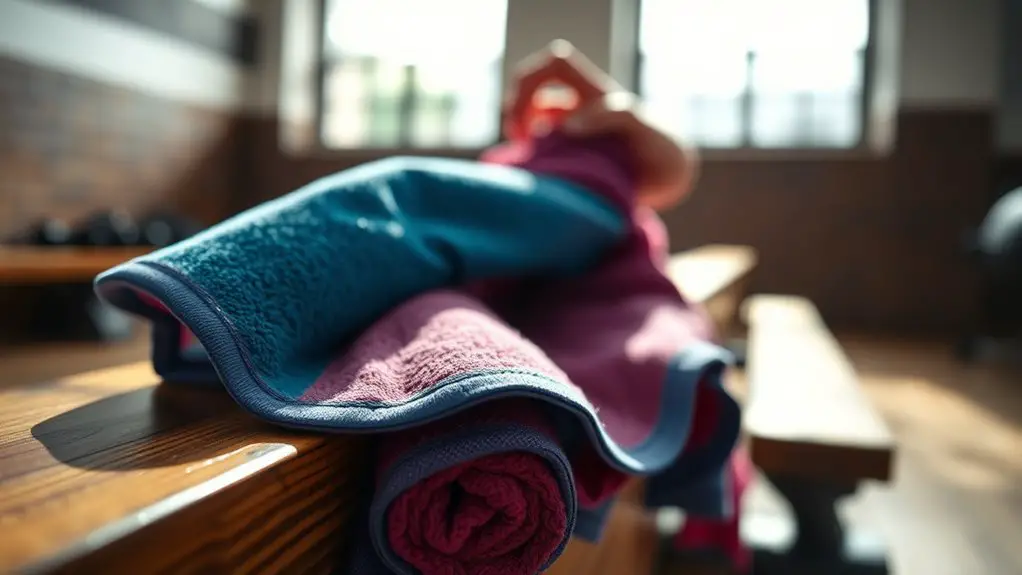
Although sharing gym towels might seem harmless, it can expose you to a range of hidden dangers. When you lend or borrow towels, you’re not just swapping fabric; you’re risking exposure to various towel materials that might not be cleaned properly. Some gym towels are made from synthetic fibers, which can trap moisture and bacteria more than natural cotton. This could lead to uncomfortable skin irritations or infections.
Good gym etiquette suggests that you should always use your own towel. It’s not just about being polite; it’s about protecting your health. Each time you wipe sweat, you might transfer oils or germs from your body onto that shared towel. Ultimately, it’s best to keep your workout gear personal and avoid any potential contamination. By sticking to your own towel, you can guarantee a cleaner, safer gym experience while also respecting the boundaries of others.
Bacteria and Germs: What You Need to Know
When you share gym towels, you’re not just exchanging fabric; you’re also passing around potentially harmful bacteria. Common culprits like staphylococcus and E. coli thrive in sweaty environments, making your gym towel a breeding ground for germs. Understanding how these pathogens spread is essential for keeping yourself healthy and avoiding unwanted infections.
Common Gym Bacteria Types
As you sweat it out at the gym, it’s vital to be aware of the common bacteria types lurking in the environment. One of the most concerning is *Staphylococcus aureus*, which can lead to skin infections. This bacteria thrives on gym equipment and can easily be transferred to your skin. Another common issue is athlete’s foot, a fungal infection that often spreads in damp areas like locker rooms and showers. It’s important to protect yourself by wearing flip-flops in these spaces and using your own towel. By understanding these bacteria, you can take proactive steps to minimize your risk and maintain your health. Remember, prevention is key in keeping your gym experience safe and enjoyable.
Sharing towels at the gym might seem harmless, but it can actually lead to the transmission of harmful bacteria and germs. When you use someone else’s towel, you risk exposing yourself to various pathogens. The towel material plays a vital role in this; porous fabrics can harbor bacteria more than smooth ones. Here’s what you need to know:
- Bacteria thrive in moist environments, making towels a perfect breeding ground.
- Improper towel storage can lead to increased bacterial growth.
- Skin contact with shared towels can transfer germs directly.
- Frequent washing is important to reduce pathogen presence.
To keep yourself safe, always use your own towel and make sure it’s stored properly to minimize exposure to harmful germs.
Fungal Infections: A Risk You Can’t Ignore
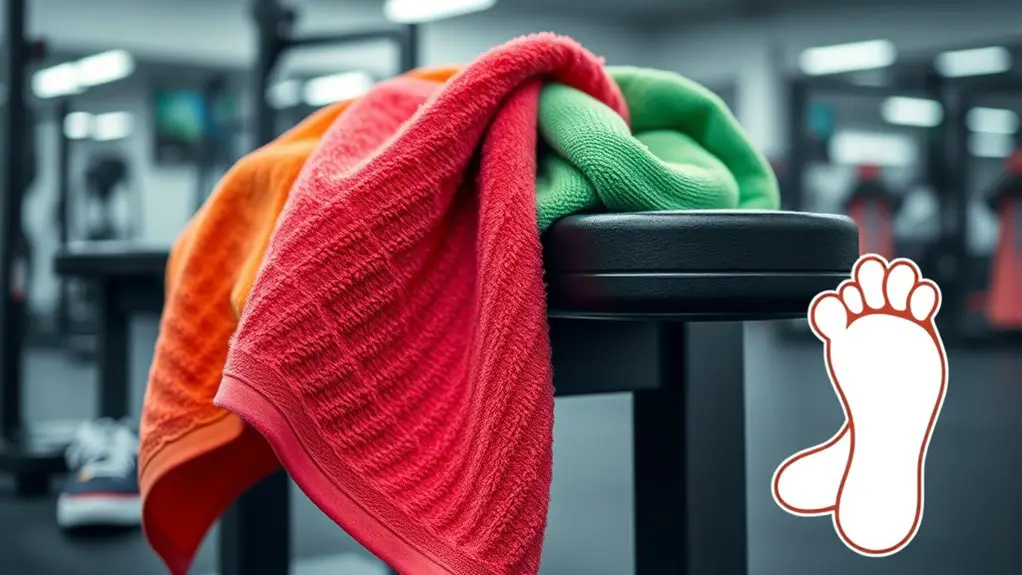
While it might seem harmless to lend or borrow towels at the gym, you could be exposing yourself to a host of fungal infections that thrive in damp environments. Sharing towels compromises your fungal prevention efforts, making it essential to keep your own towels stored properly.
Here’s a quick look at common fungal infections and their effects:
| Fungal Infection | Symptoms |
|---|---|
| Athlete’s Foot | Itching, redness |
| Ringworm | Circular rashes |
| Jock Itch | Discomfort, scaling |
| Nail Fungus | Discoloration, thickening |
To protect yourself, always use your own towel and guarantee it’s stored in a dry area. Avoid sharing towels and consider drying yours immediately after use. By taking these simple steps, you can greatly reduce the risk of fungal infections and keep your gym experience safe and enjoyable.
The Importance of Personal Hygiene in the Gym
When you hit the gym, maintaining personal hygiene should be a top priority. Bacteria and germs can easily spread in shared spaces, making it essential to protect your personal space and comfort. By adopting proper towel hygiene practices, you can keep yourself and others safe while enjoying your workout. Regular cleaning of gym bags can also help minimize the spread of germs and contribute to a healthier gym environment.
Bacteria and Germ Transmission
Even though the gym is a place for fitness and camaraderie, it can also be a breeding ground for bacteria and germs if personal hygiene isn’t prioritized. Sharing towels only increases the risk of transmission, leading to potential infections. To protect yourself and others, consider the following:
- Always use your own towel to avoid cross-contamination.
- Regularly wash your towels in hot water to eliminate bacteria.
- Educate yourself on hygiene practices to reduce risks of bacterial resistance.
- Disinfect gym equipment before and after use to maintain cleanliness.
Personal Space and Comfort
Maintaining personal space and comfort in the gym is vital for an enjoyable workout experience, especially in a setting where many people gather to exercise. Respecting personal boundaries is important; it guarantees everyone feels safe and comfortable while working out. Understanding your comfort levels and those of others can make a significant difference in the gym atmosphere.
| Personal Space Tips | Benefits | Key Takeaways |
|---|---|---|
| Keep your distance | Reduces stress | Everyone needs space |
| Use your own towel | Enhances hygiene | Avoid sharing germs |
| Be mindful of others | Builds community | Respect fosters comfort |
| Communicate politely | Encourages teamwork | Open dialogue is key |
Towel Hygiene Practices
Personal hygiene plays a significant role in creating a healthy gym environment, and towel hygiene is a key component of that. To keep your towels clean and safe, follow these essential practices:
- Proper towel storage: Always store your towels in a dry, clean place to prevent bacteria growth.
- Washing frequency: Wash your gym towels after every use to eliminate sweat and germs.
- Use separate towels: Designate specific towels for different purposes, like workouts and showering.
- Avoid sharing: Never lend or borrow towels, as this increases the risk of spreading bacteria and infections.
How Germs Spread Through Towels
While many people may not realize it, sharing gym towels can considerably increase the risk of spreading germs. Towels, regardless of their materials, can harbor bacteria and viruses, especially when damp. Cotton towels, for instance, are absorbent but can also retain moisture, creating an ideal breeding ground for germs. When you share towels, those unwelcome microorganisms can easily transfer from one person to another.
Different towel materials offer varying levels of germ resistance. For example, synthetic fibers may dry faster and resist bacteria better than natural fibers. However, no towel is completely germ-proof, particularly in a sweaty gym environment. When you wipe your face or body with a shared towel, you’re not just cleaning up; you’re potentially inviting harmful pathogens onto your skin. To stay healthy, it’s best to use your own towel, ensuring you’re minimizing the risk of unwanted germs.
Protecting Your Skin: Avoiding Rashes and Infections
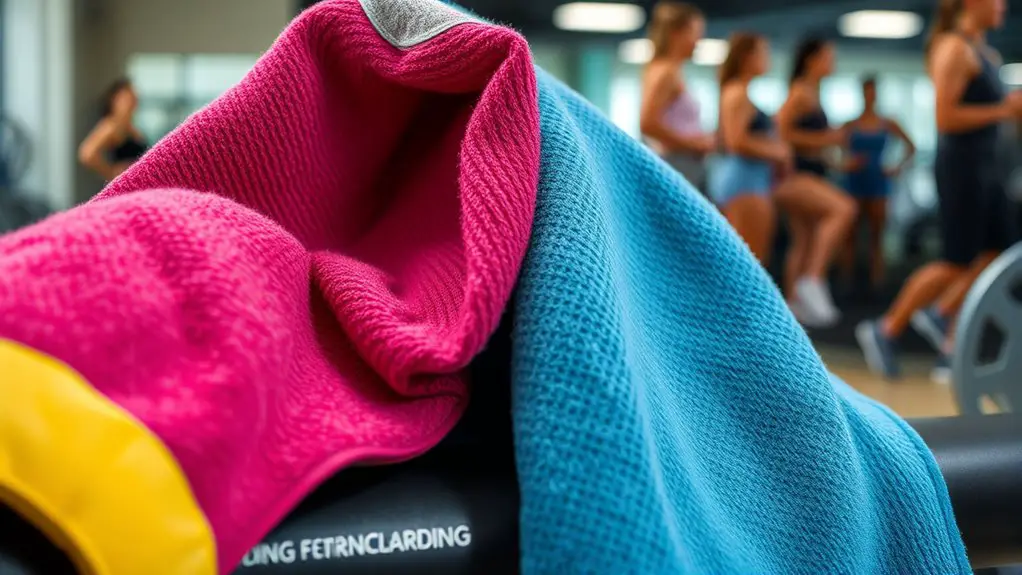
Using shared gym towels not only raises concerns about germs but also puts your skin at risk for rashes and infections. When you wipe sweat with a towel that isn’t yours, you’re exposing your skin to bacteria and fungi that can thrive in damp environments. To protect your skin health, consider the following:
- Choose the right towel materials: Opt for towels made of natural fibers, like cotton, which are less likely to harbor bacteria.
- Be mindful of skin breaks: Any cuts or abrasions can become entry points for infections, especially when using shared towels.
- Limit towel usage: Use your towel specifically for drying your body and avoid contact with gym equipment.
- Wash your towels regularly: Frequent washing helps eliminate bacteria and keeps your skin healthy.
The Role of Towels in Gym Equipment Hygiene
When it comes to gym equipment hygiene, towels play an essential role in minimizing the spread of germs. Using a personal towel made from absorbent towel material can help keep sweat off machines and free weights, reducing the risk of contamination. By adhering to proper gym etiquette, you not only protect yourself but also fellow gym-goers. Wiping down equipment before and after use shows respect for others and contributes to a cleaner environment.
It’s vital to avoid sharing your towel, as this can transfer bacteria and viruses. Instead, bring your own and guarantee it’s used solely for personal purposes. Additionally, consider choosing towels made from antimicrobial materials, which can help combat germs more effectively. By understanding the importance of towels in gym hygiene, you can create a safer workout space for everyone. Remember, a small change in your routine can lead to significant health benefits. Showering before workouts can enhance overall gym experience, which is another step towards maintaining hygiene and comfort during exercise.
Alternatives to Sharing Towels
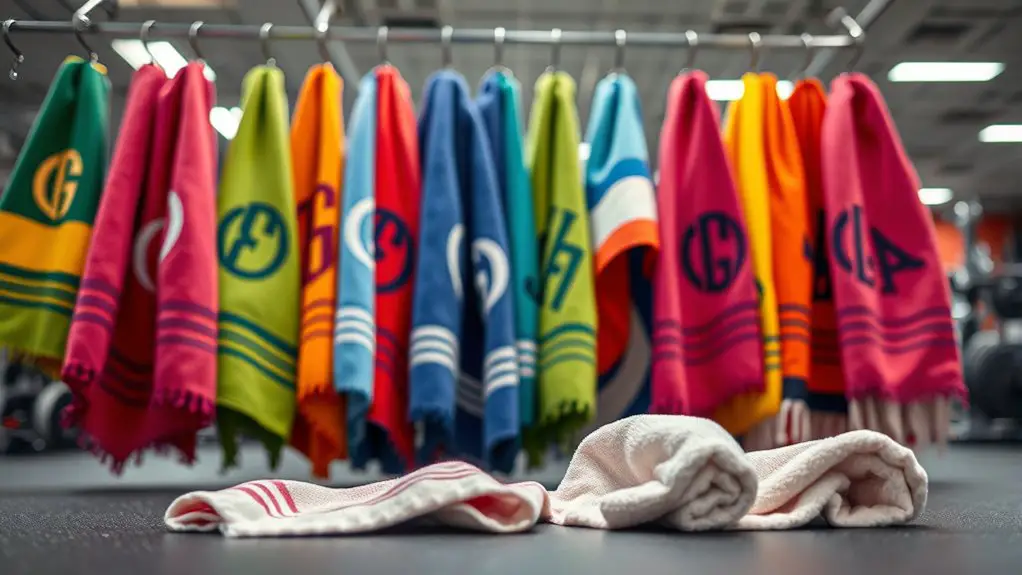
If you’re concerned about hygiene but want to maintain comfort during your workouts, there are several alternatives to sharing towels that can keep you fresh and clean. Investing in personal towels is a great way to guarantee you’re using something that’s just for you. Here are some towel alternatives you might consider:
- Microfiber Towels: Lightweight and quick-drying, perfect for gym use.
- Cooling Towels: Designed to provide a revitalizing chill during intense workouts.
- Paper Towels: Convenient for quick clean-ups or wiping down equipment.
- Wristbands: Great for absorbing sweat without the bulk of a towel. Additionally, using personal towels can help prevent joint pain that might arise from sharing equipment and towels with others.
Best Practices for Keeping Your Gym Towel Clean
To keep your gym towel clean and hygienic, it’s essential to establish a regular washing routine. Aim to wash your towel after every use to eliminate bacteria and odors. Use hot water and a mild detergent to guarantee effective cleaning, especially if your towel is made from absorbent materials like cotton or microfiber.
Proper towel storage is also important. Always store your towel in a dry, ventilated area to prevent mold and mildew growth. If you’re using a gym bag, opt for one with ventilation or a separate compartment to keep your towel from soaking other items.
Consider investing in multiple towels made from high-quality materials that resist odors and bacteria. This way, you’ll always have a fresh towel ready to go. By following these best practices, you’ll maintain a clean towel that supports your fitness routine without compromising your hygiene.
Frequently Asked Questions
Washing shared towels can reduce germ transmission, but it’s essential to practice proper towel hygiene. Use hot water and detergent, and dry them thoroughly. Regularly replacing towels also helps minimize the risk of germs spreading.
How Often Should I Wash My Personal Gym Towel?
You should wash your personal gym towel after every workout to maintain proper towel hygiene. Regular washing guarantees you’re not harboring bacteria, keeping your towel fresh and clean, which is essential for an effective workout routine.
Are There Specific Materials That Resist Bacteria Better?
Certain towel materials, like microfiber and bamboo, offer better bacterial resistance than traditional cotton. These options not only absorb moisture effectively but also help minimize the growth of bacteria, making your gym experience healthier and safer.
What Should I Do if I Develop a Rash?
If you develop a rash, it’s important to assess the irritation. For rash treatment, keep the area clean, moisturized, and consider over-the-counter creams. Always prioritize skin care and consult a dermatologist if symptoms persist.
Yes, gym equipment can carry germs from shared towels. Poor towel hygiene contributes to germ transmission, increasing your risk of skin infections. Always use your own towel and guarantee it’s clean to protect your health.



